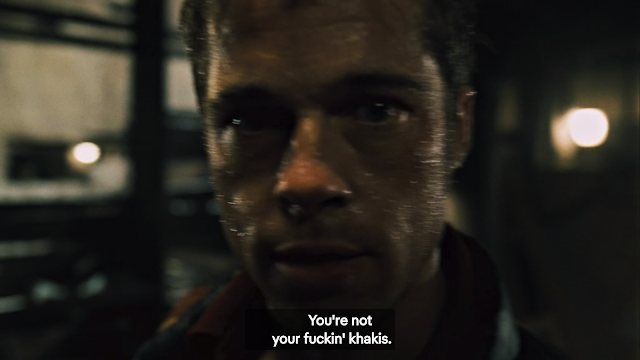It's important to talk about the faux relationship forged between identity and commercial products by advertisers and manipulators of human emotion and psychology, an amoral trade which has been honed since commerce began.
"You are not your job, you're not how much money you have in the bank. You are not the car you drive. You're not the contents of your wallet. You are not your fucking khakis. You are the all singing, all dancing crap of the world."
 |
| If Fight Club is your jam, consider checking out Mr. Robot. It may be the greatest torch-bearing contemporary which refined and modernised the message. |
"Self-improvement is masturbation. Now self-destruction..."
Fight Club was never about selling you something, it was getting you to buy out of perpetual consumerism and self improvement that people have tried to tie to your identity. Advertisers and merchants have been perfecting the craft for centuries. This here's the real con in consumerism. The promise that if you use a product or service it will improve or carve out your identity, then others will like you more. Then you won't be lonely.
In truth, the thing people are really trying to sell you is something you can't actually purchase. You can't buy it. It's just not that easy. There aren't even any reliable shortcuts with regards developing a robust identity. Working out who you and developing your identity is a gradual, lifelong journey which involves periods of stagnation, isolation and deep self-reflection in a punctuated equilibrium-type model. Propping up an identity with commodities, objects or hobbies is a superficial mask rather than a bypass. It gives the impression of an identity without having to do any of the work. Your identity is everything you are once externalities are stripped away. It's defined by the absence of confounding variables, not the sum total.
"Let go!"
Fight Club is constantly reminding you of this throughout. The most clear to me is the car scene. Abandoning the relationship between commodities and self is freeing. You learn the shape of your identity once you remove the putty covering the imperfections. Only then can you see who you are. Looking inward is the only way forward. It's raw, flawed and unfiltered, but it's who you are. In the age of social media and serotonin saturation, a flawless facade of identity can be carefully synthesised, and even believed. But it's not real. It's not you. It's just PR. Even #nofilter is part of the narrative of a calculated and constructed identity. The unhealthy obsession with maintaining a well-filtered online identity is a real issue we need to deal with both on a societal and individual level. The cons probably outweigh the pros here. Imagine being able to change the world with a version release. Humanity hyperconnected but everlonely.
"It's only after we've lost everything that we're free to do anything".
I think it's probably a common thought process that if you don't build up a dynamic personality of interesting interests, objects and hobbies that people will be bored by you and therefore not like you, leading to loneliness. Ironically, loneliness is something we all go through together, separately. I think it's a bug/feature of the human experience. Existence just happens to be a lonely thing, even for the hypersocial. Personally, I don't think it ever goes away - loneliness that is. It will always encapsulate your entire existence like an enteric coating, as life slowly digests you back into nutrients, not that you ever weren't. That's not entirely a bad thing though. That nakedness that loneliness exposes gives you a chance to see yourself for who you are. Only then can you evolve.
Your human experience is totally novel, yet completely common. This means two major things: you are not special, but you are unique. Therefore, your identity has value because there is no one else like you. You don't have 'value' in the intrinsic sense that 'all life and opinions are valuable' etc, but for the simple fact that there is no one else exactly the same as you. It's a pretty amazing thing to think about. In all of human existence, there has never been another you. There will be others highly similar to you or will share similar patterns of behaviour, but for now you can rest easy with your distinct but meaningless existence.
As a sidenote: in the future if cloning/brain uploading becomes legal/possible then there will be beings that are almost you, but they will be completely disconnected from your personal human experience.
The double-edged sword of uniqueness cuts through everyone. It's a festering wound of isolation and loneliness because no one can ever really understand what it means to be you. Understandably, they either don't care nor have time to find out because they are busy feeling the same way about their own existence. This is why trimming the fat and excising the shit you patch your identity with is liberating. You are not your taste in music, nor the number of social media followers. You are a unique but inconsequential organism. You are flawed and one day you are going to die and never come back. Once you really understand that, you'll start to see the fuzzy outline of who you really are, then there's nowhere you can go but up.




No comments:
Post a Comment